天津市耀华中学2013-2014学年高二下学期期中考试 英语 Word版含答案
- 格式:doc
- 大小:871.00 KB
- 文档页数:10
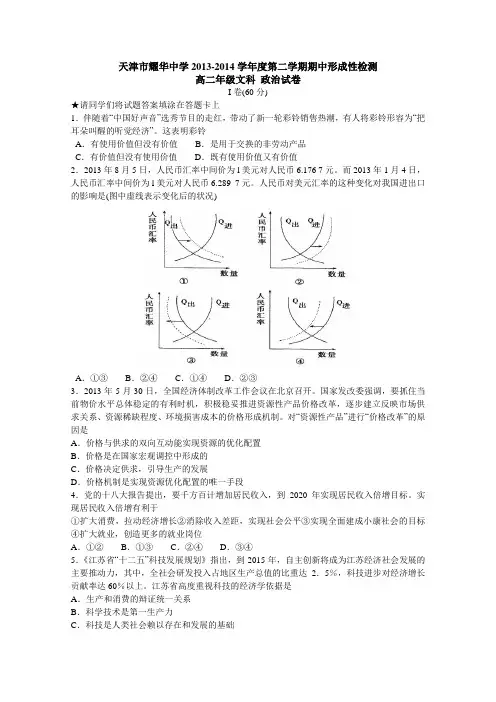
天津市耀华中学2013-2014学年度第二学期期中形成性检测高二年级文科政治试卷I卷(60分)★请同学们将试题答案填涂在答题卡上1.伴随着“中国好声音”选秀节目的走红,带动了新一轮彩铃销售热潮,有人将彩铃形容为“把耳朵叫醒的听觉经济”。
这表明彩铃A.有使用价值但没有价值B.是用于交换的非劳动产品C.有价值但没有使用价值D.既有使用价值又有价值2.2013年8月5日,人民币汇率中间价为l美元对人民币6.176 7元。
而2013年1月4日,人民币汇率中间价为l美元对人民币6.289 7元。
人民币对美元汇率的这种变化对我国进出口的影响是(图中虚线表示变化后的状况)A.①③B.②④C.①④D.②③3.2013年5月30日,全国经济体制改革工作会议在北京召开。
国家发改委强调,要抓住当前物价水平总体稳定的有利时机,积极稳妥推进资源性产品价格改革,逐步建立反映市场供求关系、资源稀缺程度、环境损害成本的价格形成机制。
对“资源性产品”进行“价格改革”的原因是A.价格与供求的双向互动能实现资源的优化配置B.价格是在国家宏观调控中形成的C.价格决定供求,引导生产的发展D.价格机制是实现资源优化配置的唯一手段4.党的十八大报告提出,要千方百计增加居民收入,到2020年实现居民收入倍增目标。
实现居民收入倍增有利于①扩大消费,拉动经济增长②消除收入差距,实现社会公平③实现全面建成小康社会的目标④扩大就业,创造更多的就业岗位A.①②B.①③C.②④D.③④5.《江苏省“十二五”科技发展规划》指出,到2015年,自主创新将成为江苏经济社会发展的主要推动力,其中,全社会研发投入占地区生产总值的比重达2.5%,科技进步对经济增长贡献率达60%以上。
江苏省高度重视科技的经济学依据是A.生产和消费的辩证统一关系B.科学技术是第一生产力C.科技是人类社会赖以存在和发展的基础D.科学技术可以迅速提高人民生活水平6.国有企业是我国国民经济的支柱,中央企业是我国国企的主力军。
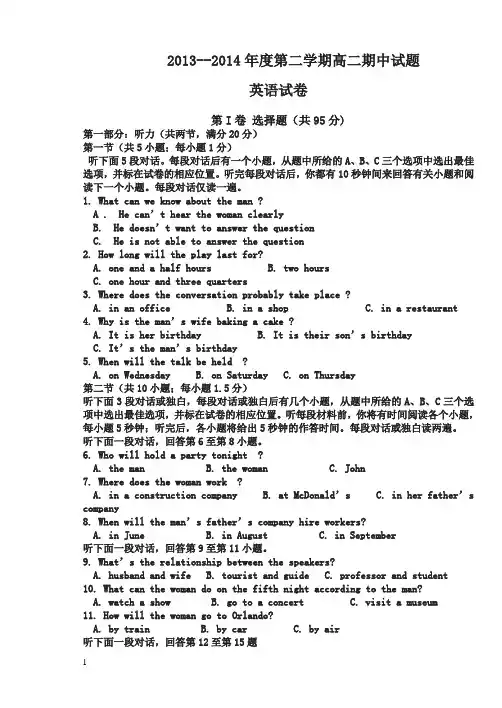
2013--2014年度第二学期高二期中试题英语试卷第I卷选择题(共95分)第一部分:听力(共两节,满分20分)第一节(共5小题;每小题1分)听下面5段对话。
每段对话后有一个小题,从题中所给的A、B、C三个选项中选出最佳选项,并标在试卷的相应位置。
听完每段对话后,你都有10秒钟间来回答有关小题和阅读下一个小题。
每段对话仅读一遍。
1. What can we know about the man ?A . He can’t hear the woman clearlyB. He doesn’t want to answer the questionC. He is not able to answer the question2. How long will the play last for?A. one and a half hoursB. two hoursC. one hour and three quarters3. Where does the conversation probably take place ?A. in an officeB. in a shopC. in a restaurant4. Why is the man’s wife baking a cake ?A. It is her birthdayB. It is their son’s birthdayC. It’s the man’s birthday5. When will the talk be held ?A. on WednesdayB. on SaturdayC. on Thursday第二节(共10小题;每小题1.5分)听下面3段对话或独白,每段对话或独白后有几个小题,从题中所给的A、B、C三个选项中选出最佳选项,并标在试卷的相应位置。
听每段材料前,你将有时间阅读各个小题,每小题5秒钟;听完后,各小题将给出5秒钟的作答时间。
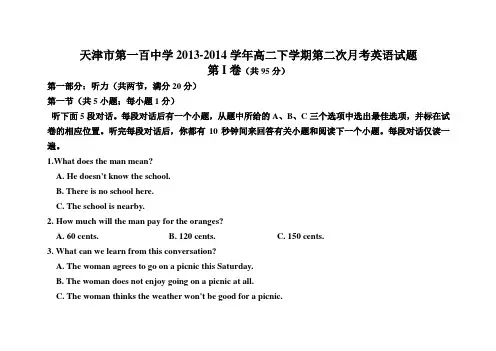
天津市第一百中学2013-2014学年高二下学期第二次月考英语试题第I卷(共95分)第一部分:听力(共两节,满分20分)第一节(共5小题;每小题1分)听下面5段对话。
每段对话后有一个小题,从题中所给的A、B、C三个选项中选出最佳选项,并标在试卷的相应位置。
听完每段对话后,你都有10秒钟间来回答有关小题和阅读下一个小题。
每段对话仅读一遍。
1.What does the man mean?A. He doesn't know the school.B. There is no school here.C. The school is nearby.2. How much will the man pay for the oranges?A. 60 cents.B. 120 cents.C. 150 cents.3. What can we learn from this conversation?A. The woman agrees to go on a picnic this Saturday.B. The woman does not enjoy going on a picnic at all.C. The woman thinks the weather won't be good for a picnic.4.Why is the man proud of his daughter?A. She looks attractive.B. She has a nice character.C. She is successful in her work.5. What does Jim do?A. He is a teacher.B. He is a student.C. He is a writer.第二节(共10小题;每小题1.5分)听下面3段对话或独白,每段对话或独白后有几个小题,从题中所给的A、B、C三个选项中选出最佳选项,并标在试卷的相应位置。
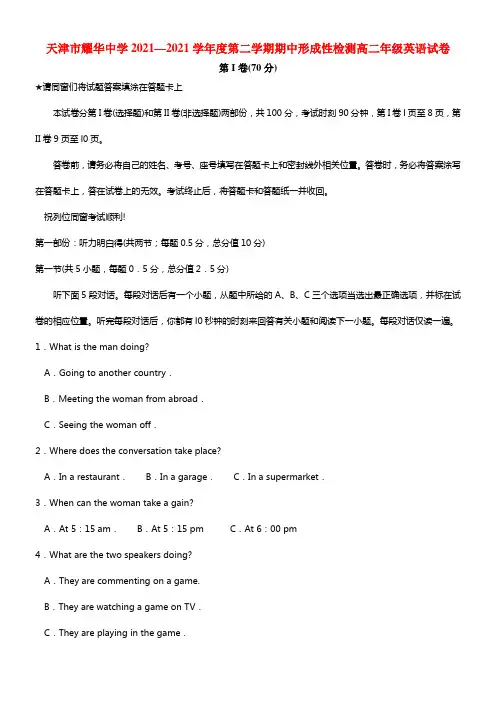
天津市耀华中学2021—2021学年度第二学期期中形成性检测高二年级英语试卷第I卷(70分)★请同窗们将试题答案填涂在答题卡上本试卷分第I卷(选择题)和第II卷(非选择题)两部份,共100分,考试时刻90分钟,第I卷l页至8页,第II卷9页至l0页。
答卷前,请务必将自己的姓名、考号、座号填写在答题卡上和密封线外相关位置。
答卷时,务必将答案涂写在答题卡上,答在试卷上的无效。
考试终止后,将答题卡和答题纸一并收回。
祝列位同窗考试顺利!第一部份:听力明白得(共两节;每题0.5分,总分值10分)第一节(共5小题,每题0.5分,总分值2.5分)听下面5段对话。
每段对话后有一个小题,从题中所给的A、B、C三个选项当选出最正确选项,并标在试卷的相应位置。
听完每段对话后,你都有l0秒钟的时刻来回答有关小题和阅读下一小题。
每段对话仅读一遍。
1.What is the man doing?A.Going to another country.B.Meeting the woman from abroad.C.Seeing the woman off.2.Where does the conversation take place?A.In a restaurant.B.In a garage.C.In a supermarket.3.When can the woman take a gain?A.At 5:15 am.B.At 5:15 pm C.At 6:00 pm4.What are the two speakers doing?A.They are commenting on a game.B.They are watching a game on TV.C.They are playing in the game.5.What’s the reason that the man won't go outing tomorrow?A.He doesn't like going outing.B.He is not feeling well.C.He has to look after his mother.第二节(共10小题,每题0.5分,总分值7.5分)听下面5段对话或独白。
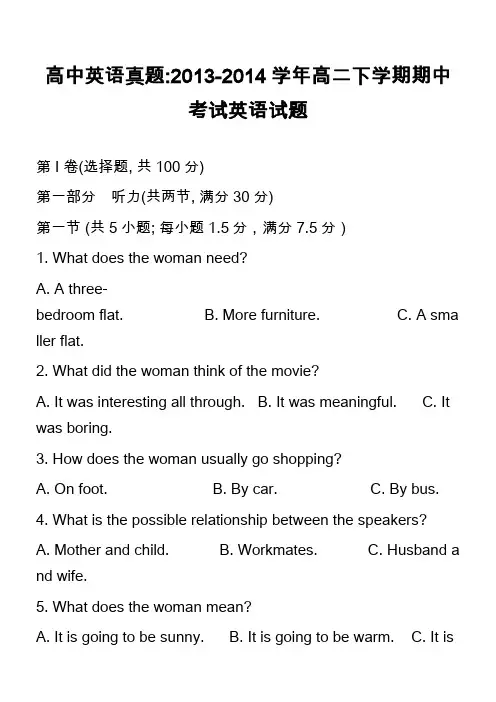
高中英语真题:2013-2014学年高二下学期期中考试英语试题第 I 卷(选择题, 共100分)第一部分听力(共两节, 满分30分)第一节 (共5小题; 每小题1.5分,满分7.5分)1. What does the woman need?A. A three-bedroom flat. B. More furniture. C. A sma ller flat.2. What did the woman think of the movie?A. It was interesting all through.B. It was meaningful.C. It was boring.3. How does the woman usually go shopping?A. On foot.B. By car.C. By bus.4. What is the possible relationship between the speakers?A. Mother and child.B. Workmates.C. Husband a nd wife.5. What does the woman mean?A. It is going to be sunny.B. It is going to be warm.C. It isnot going to be fine.第二节 (共15小题; 每小题1.5分, 满分22.5分)听第6段材料, 回答第6、7题。
6. Why is the man taking the trip?A. For study.B. For business.C. For sightseeing.7. Which country will the man go to?A. France.B. America.C. Britain.听第7段材料, 回答第8、9题。
8. What is the lecture about?A. Cloning.B. Chemistry.C. Biology.9. Which book does the woman want to read?A. A book on developing interests.B. A book on biochemistr y.C. A book on genetic engineering.听第8段材料, 回答第10至12题。
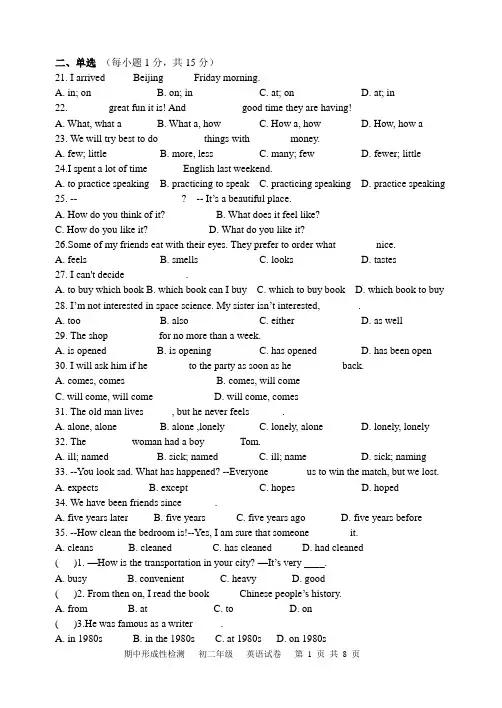
二、单选(每小题1分,共15分)21. I arrived _____Beijing _____ Friday morning.A. in; onB. on; inC. at; onD. at; in22. _______ great fun it is! And __________ good time they are having!A. What, what aB. What a, howC. How a, howD. How, how a23. We will try best to do ________ things with _______ money.A. few; littleB. more, lessC. many; fewD. fewer; little24.I spent a lot of time ______ English last weekend.A. to practice speakingB. practicing to speakC. practicing speakingD. practice speaking25. -- ____________________? -- It’s a beautiful place.A. How do you think of it?B. What does it feel like?C. How do you like it?D. What do you like it?26.Some of my friends eat with their eyes. They prefer to order what _______ nice.A. feelsB. smellsC. looksD. tastes27. I can't decide____________.A. to buy which bookB. which book can I buyC. which to buy bookD. which book to buy28. I’m not interested in space science. My sister isn’t interested, _______.A. tooB. alsoC. eitherD. as well29. The shop _________ for no more than a week.A. is openedB. is openingC. has openedD. has been open30. I will ask him if he _______ to the party as soon as he _________ back.A. comes, comesB. comes, will comeC. will come, will comeD. will come, comes31. The old man lives _____, but he never feels ______.A. alone, aloneB. alone ,lonelyC. lonely, aloneD. lonely, lonely32. The ________ woman had a boy ______ Tom.A. ill; namedB. sick; namedC. ill; nameD. sick; naming33. --You look sad. What has happened? --Everyone_______ us to win the match, but we lost.A. expectsB. exceptC. hopesD. hoped34. We have been friends since ______.A. five years laterB. five yearsC. five years agoD. five years before35. --How clean the bedroom is!--Yes, I am sure that someone _______ it.A. cleansB. cleanedC. has cleanedD. had cleaned( )1. —How is the transportation in your city? —It’s very ____.A. busyB. convenientC. heavyD. good( )2. From then on, I read the book _____ Chinese people’s history.A. fromB. atC. toD. on( )3.He was famous as a writer _____.A. in 1980sB. in the 1980sC. at 1980sD. on 1980s( )4. —What would you like to drink?—I’d like a cup of tea _______ coffee. I like gr een tea.A. bothB. rather thanC. andD. or( )5. Hong Kong ____ to be a good place for eating today.A. knowsB. knewC. is knownD. was known( )6. —What happened to Billy? —He ______ because of his drink-driving.A. is caughtB. was caughtC. has caughtD. had caught( )7. Our geography teacher told us the sun _____ in the east.A. getsB. risesC. raisesD. lifts( )8. What does Tony suggest _____ in the fridge?A. putB. puttingC. to putD. puts( )9. — Can I _______ your umbrella? —I’m sorry, I have _______ it to my friend.A. borrow; lendB. borrow; lentC. lend; borrowedD. lent; borrowed( )10. —_____ is the Amazon River?—Some experts say it’s 7,025 kilometres but others say it’s 6,440 kilometres.A. How farB. How soonC. How muchD. How long( )11. If I _______ four minutes, I will get everything ready.A. gaveB. giveC. will giveD. am given( )12. The man stood there and _____ my question.A. replyed toB. answerC. replied toD. answered to( )13. When I looked up, he has already disappeared _____ the distance.A. toB. intoC. onD. of( )14. Our teacher asked us to write a(n) _____ about something interesting happening in the summer holidays.A. compositionB. examC. pictureD. music( )15. —Is it going to be colder tomorrow? —Yes. The radio says it will be five _____ zero.A. belowB. withC. underD. up( )16. The river runs _____ the village.A. acrossB. crossC. overD. through( )17. We had an English party last weekend, and it was so fun. Why don’t we have _____ one this weekend?A. moreB. anotherC. the otherD. other( )18. —What do you think of my new bike?—Sorry, but what did you say? I _____ about something else.A. thinkB. am thinkingC. thoughtD. was thinking( )19. No permission has _______ for anybody to enter the building.A. been givenB. givenC. to giveD. be giving( )20. When _____ the earthquake _____ in Japan?A. did; happenB. does; happenC. did; happenedD. does; happened( )21. —We don’t have t o go to school tomorrow. —Really? _____A. It’s true.B. I don’t know.C. Why not tell me?D. That’s news to me. ( )22.—Is Mr. Brown famous _____ his poems?—Yes, but he isn’t known _____ a great writer like his father.A. for; asB. as; forC. in; toD. to; in( )23. —Someone is knocking at the door.—It _____ be our cousin. He called and told me that he was coming to see us today.A. mayB. wouldC. mustD. can( )24. —I haven’t seen your grandfathe r for several years. Where has he gone?—Oh, he _____ for two years.A. has diedB. has been deadC. diedD. was died( )25._____ Li Ming got up very early this morning, he still missed the first bus.A. IfB. WhenC. AlthoughD. Because( )26.The baby is crying. Can you make it _____?A. to stop to cryB. to stop cryingC. stop to cryD. stop crying( )27.What he said _____ me _____.A. make; angryB. makes; angrilyC. makes; angryD. make; angrily ( )28.His bike is broken. It needs _____ soon.A. be repairB. to repairC. to be repairD. to be repaired ( )29.Coats are used _____.A. keep warmB. for keeping warmC. to keep warmlyD. keeping warmly ( )30. —The tea smells really nice, Mary. Where is it _____?—In a city in South China. A. created B. published C. produced D. replaced( )31.The forests have almost gone. We must ______ people ______ down too many trees.A. stop; to cutB. stop; from cuttingC. to stop; to cutD. to stop; cutting ( )32.Do you think it is _____ to throw away glass, metal and paper?A. importantB. necessaryC. wastefulD. impolite( )33. —How was the weather yesterday?—It was terrible. It rained _____. People could _____ go out.A. hardly; hardlyB. hardly; hardC. hard; hardD. hard; hardly ( )34._____ exciting news! We’ve never had _____ long vacation before.A. What; such aB. What an; such aC. How; such aD. What; so a ( )35.The boy ______ streets without pay in the old days.A. was made to cleanB. made cleanC. was made cleanD. made to clean ( )36. —Oh, there isn’t enough _____ for us in th e lift. —No hurry. Let’s wait for the next.A. groundB. roomC. placeD. floor( )37. —What did Mum say just now?—She told us _____ attention _____ everything clean and tidy.A. to pay; to keepB. paying; to keepingC. to pay; to keepingD. paying; tokeep( )38.Kate’s never late for school, _____?A. isn’t sheB. has sheC. is sheD. hasn’t she( )39._____ when the plane will take off.A. Find outB. FindC. LookD. Look out( )40. —_____? Would you mind opening the door? —OK, if you like.A. Can I help youB. What can I do for youC. What’s upD. Can I ask a favor三、完型填空(每小题1分,共10分)Mike Robinson is a 15-year-old English schoolboy. His sister Clare is 14. At the moment, Mike and Clare are at a school in Sydney, one of the biggest ______(36) in Australia. They have been there for two years. They like the school, but they know that soon they will leave and return to England ______ (37) their parents.Mike and Clare have ______ (38) been to schools in America, Germany, France and China. This is because their father, Peter works for a very big international company. The company has offices in many ______ (39) countries. The company has ______ (40)Peter to work in many different countries. Peter ______ (41) stays in one country for about two years. Then the company moves him again. His family always goes with him.The Robinsons are a happy ______ (42)and love seeing the world. Mike and Clare have learnt to speak French, German and ______ (43) Chinese. The two children have friends all over the world. ______(44) they are glad that they are going to return to England.Recent ly, the children told their parents, “We went to st a y in England. We don’t want to move again.” Their father agrees and has asked his company to keep him in England. The company has ______ (45). Mike and Clare are very happy about this.36. A. towns B. cities C. countries D. places37. A. for B. to C. with D. without38. A. too B. either C. neither D. also39. A. different B. difficult C. same D. beautiful40. A. asked B. sent C. ordered D. got41. A. often B. always C. sometimes D. usually42. A. family B. home C. house D. person43. A. few B. a few C. little D. a little44. A. Because B. So C. But D. Though45. A. refused B. agreed C. answered D. known四、阅读理解(每小题1分,共15分)A46. If you want to eat Chinese food, you will go to the restaurant in _____.A. the Fairview HotelB. the First HotelC. the Orchard HotelD. the Osaka Hotel47. The cheapest price for a single bed is _____in _____in Boswell.A. $12; the First HotelB. $15; the Osaka HotelC. $12; the Fairview HotelD. $25; the Orchard Hotel48. If a Japanese traveler likes to eat in a French restaurant, ______is the right place for him to go to.A. 233 Edward RoadB. 222 Edward RoadC. 1264 Venning RoadD. 129 North Road49. Which hotel faces the Orchard Hotel?A. The First Hotel.B. The Osaka Hotel.C. The Fairview Hotel.D. No Hotel.50. If you want to live in a hotel close to the airport, you can go to _____.A. the Fairview HotelB. the First HotelC. the Orchard HotelD. the Osaka HotelBMr. Brown was going away for a week. Before he left, he said to his son, "if anyone asks for me, you can tell him that your father has been out for doing something, and will be back in a week, then be sure to ask him to sit down for a cup of tea.""OK, Dad," said his son. But he was afraid his son couldn't remember this, he wrote thesewords down on a piece of paper and gave it to him. His son put it into his small pocket, took it out and looked at it every now and then.Four days passed, but no one came to see his father. The boy thought that there was no man to come and that the piece of paper was of no more use for him, so he burnt it that evening. The next afternoon, someone knocked at the door. The boy opened it. A man was standing at the door and said, "Where is your father?" The boy put his hand into his pocket at once and looked for the piece of paper. He could not find it. He suddenly remembered he had burnt it, so he shouted, "No more."The man was very surprised. He asked, "No more? I met your father last week. When did it happen?""Burnt yesterday evening."51. Mr. Brown told his son that _____.A. he would be away from home for four daysB. he would be back in seven daysC. he would be back in a monthD. he liked a cup of tea52. Mr. Brown wrote the words down on ________.A. the wallB. the doorC. a piece of paperD. his son's pocket53. A man came to visit the boy's father on ________.A. the second dayB. the third dayC. the fourth dayD. the fifth day54. The man was very surprised because _________.A. he thought the child's father was deadB. the child didn't ask him to sit downC. the child gave him a cup of teaD. he couldn't find that piece of paper55. What was burnt? ___________.A. The piece of paperB. Mr. SmithC. The visitorD. The boyCThese days, people in Britain and the US do not wear very formal clothes. But sometimes it is important to wear the right thing.Many American people don't think about clothes very much. They just like to be comfortable. When they go out to enjoy themselves, they can wear almost anything. At theatres, cinemas and concert you can put on what you like-from elegant suits and dresses to jeans and sweaters. Anything goes, as long as you look clean and tidy.But in Britain, as well as the US men in offices usually wear suits and ties, and women wear dresses or skirts (not trousers). Doctors, lawyers and business people wear quite formal clothes. And in some hotels restaurants men have to wear ties and women wear smart dresses.In many ways, Americans are more relaxed than British people, but they are more careful with their clothes. At home, or on holiday, most Americans wear informal or sports-clothes. But when they go out in the evening, they like to look elegant. In good hotels and restaurants, men have to wear jackets and ties, and women wear pretty clothes and smart hairstyles.It is difficult to say exactly what people wear in Britain and the US, because everyone is different. If you are not sure what to wear, watch what other people do and then do the same.You'll feel more relaxed if you don't look too different from everyone else.56. If you visit an American friend in the evening, you may find that your friend wears ______ .A. pretty clothsB. informal clothes C .formal clothes D. dirty clothes57. Who doesn't usually wear suits and ties?A. Lawyers.B. DoctorsC. Drivers.D. Secretaries.58. Many British people dress freely when they ________ .A. attend meetingsB.attend lecturesC. spend their spare time D .have business meetings59. If you are in a foreign country, for clothes you'd better __________ .A .wear strange clothes B. follow othersC. wear your native clothesD. wear pretty clothes60. Which sentence is true according to the passage?A. These days, most people in Britain and the US wear very formal clothes.B. At theatres, cinemas you can put on what you like so long as they are clean and tidy.C. Doctors, business people wear informal clothes in Britain.D. In many ways, Americans are more relaxed than British people, but they are more careful with their clothes.八、综合填空The computer is a m 76 that works very fast. It can add numbers much faster than a p 77 can. It can remember better than a person. It can do many other things. In school a computer can do maths. It can help boys and girls read, w 78, and spell. It can r______79 the names of all the students in the school.Computers help people drive cars and f 80 planes. A spaceship needs many computers. Telephones and televisions use computers, too. Some computers, c 81 fax machines, can send letters. The letters can travel f 82.A computer can remember w 83 is in a store. It knows all the prices. It tells you how much to p 84. It gives you change. Computers can play games, too. A computer named Big Blue is very good at c 85. It beat the best chess player in the world.Computers are changing the way we live.Why do people wear clothes? The answer will probably be “To m__31_me warm and to cover my body”. That’s w__32_ people wear clothes, but people a__33_ want to look attractive and appear successfully to others. If people only wore clothes for warmth and to cover their bodies, most clothes would be simple and c__34_. In many countries, h__35_, clothes are sometimes very expensive. The main r__36_ for this is not the cost of the materials or the cost of making clothes. The clothes are expensive because of fashion. Successful b__37_, for example, often wear very expensive suits, shirts and ties. So they p_38_ thousands of dollars for a suit and hundreds of dollars f or a tie. It’s still just a suit and a tie but they pay these prices because of the famous designer. Fashion is constantly changing. It means that people who wantto be fashionable have to buy new clothes e_39_few months, e__40_ if last month’s clothes have only been worn once or twice. Some people have boxes full of clothes, but some of these clothes have never been worn. These clothes are no longer in fashion though they are still new.九、书面表达(共10分)根据调查,中学生面临太多的竞争和压力,体育锻炼的时间少了,身体素质有所下降,视力衰退,体力不足。
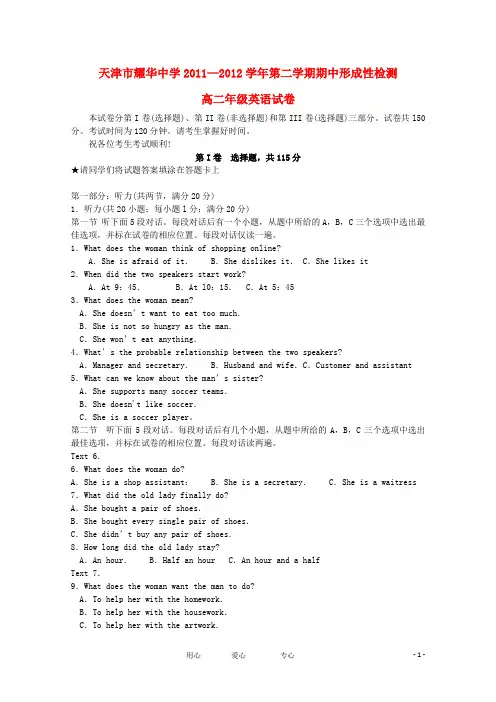
天津市耀华中学2011—2012学年第二学期期中形成性检测高二年级英语试卷本试卷分第I卷(选择题)、第II卷(非选择题)和第III卷(选择题)三部分。
试卷共l50分。
考试时间为120分钟。
请考生掌握好时间。
祝各位考生考试顺利!第I卷选择题,共115分★请同学们将试题答案填涂在答题卡上第一部分:听力(共两节,满分20分)1.听力(共20小题;每小题l分;满分20分)第一节听下面5段对话。
每段对话后有一个小题,从题中所给的A,B,C三个选项中选出最佳选项,并标在试卷的相应位置。
每段对话仅读一遍。
1.What does the woman think of shopping online?A.She is afraid of it. B.She dislikes it. C.She likes it2.When did the two speakers start work?A.At 9:45. B.At l0:15. C.At 5:453.What does the woman mean?A.She doesn’t wan t to eat too much.B.She is not so hungry as the man.C.She won’t eat anythin g.4.What’s the probable relationship between the two speakers?A.Manager and secretary. B.Husband and wife.C.Customer and assistant 5.What can we know about the man’s sister?A.She supports many soccer teams.B.She doesn't like soccer.C.She is a soccer player。
第二节听下面5段对话。
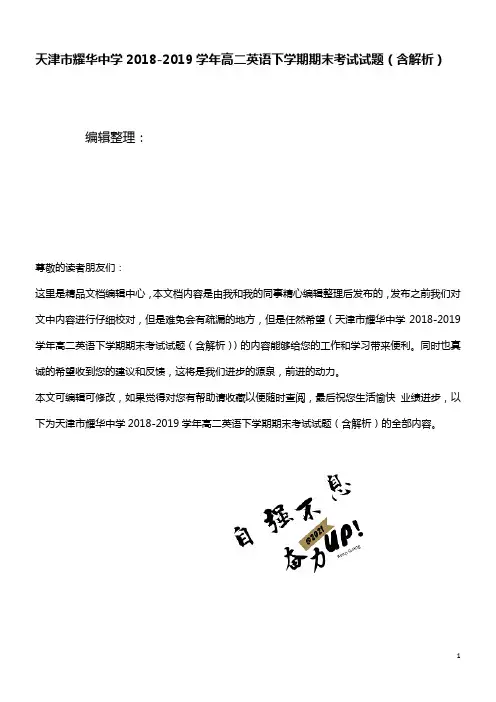
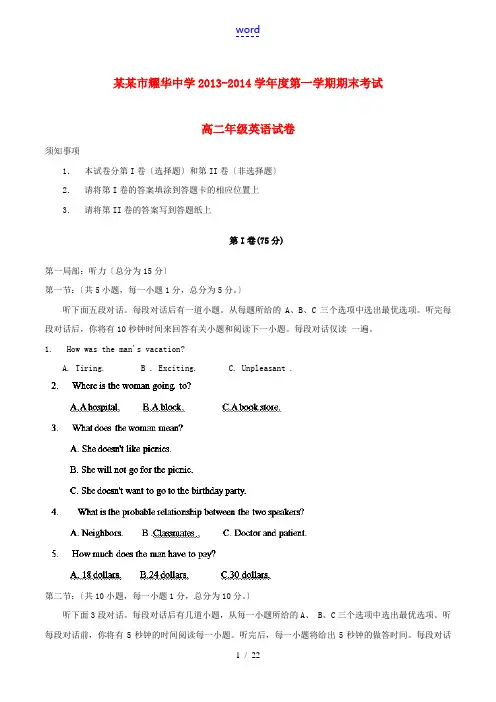
某某市耀华中学2013-2014学年度第一学期期末考试高二年级英语试卷须知事项1.本试卷分第I卷〔选择题〕和第II卷〔非选择题〕2.请将第I卷的答案填涂到答题卡的相应位置上3.请将第II卷的答案写到答题纸上第I卷(75分)第一局部:听力〔总分为15分〕第一节:〔共5小题,每一小题1分,总分为5分。
〕听下面五段对话。
每段对话后有一道小题。
从每题所给的A、B、C三个选项中选出最优选项。
听完每段对话后,你将有10秒钟时间来回答有关小题和阅读下一小题。
每段对话仅读一遍。
1. How was the man's vacation?A. Tiring. B . Exciting. C. Unpleasant .第二节:〔共10小题,每一小题1分,总分为10分。
〕听下面3段对话。
每段对话后有几道小题,从每一小题所给的A、 B、C三个选项中选出最优选项。
听每段对话前,你将有5秒钟的时间阅读每一小题。
听完后,每一小题将给出5秒钟的做答时间。
每段对话读两遍。
听第6段材料,回答第6至8题。
6. Which of the following is NOT mentioned in the conversation?A. Earthquake. B .Fire. C. Volcano .7. When does Florida have hurricanes every year?A. From June to July. B .From June to October. C. From June to September.8. How many houses were destroyed due to Hurricane Andrew in 1992?A. 18.B.3,000.C.30.000.听第7段材料,回答第9至1 1题。
12. Where is the eastern border of Russia?A. The Arctic Ocean.B. The Pacific Ocean.C. The Black Sea.13. Which of the following does Russia have according to the talk?A. The largest forest in Europe.B. The highest mountain in Asia.C. The deepest lake in the world.14. How many native languages are there in Russian?A. Over 100 languages.B. Over 70 languages.C. 100 languages.15. How long is the Black Sea very warm in one year?A. For three months.B. For five months.C. For six months. '第二局部:英语知识运用〔共两节,总分为35分。
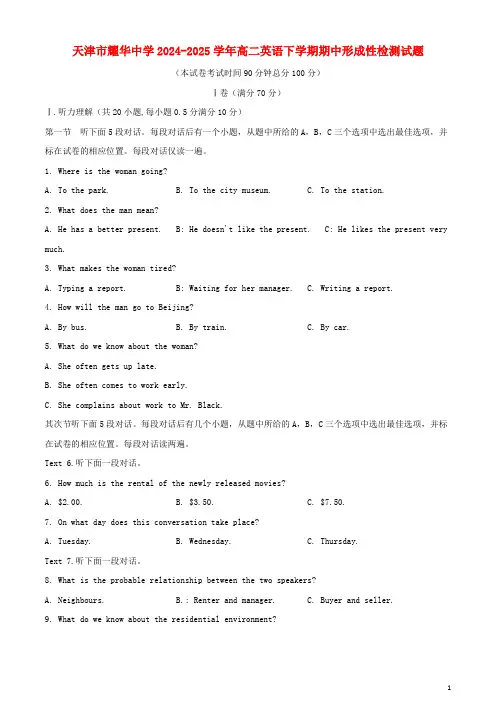
天津市耀华中学2024-2025学年高二英语下学期期中形成性检测试题(本试卷考试时间90分钟总分100分)Ⅰ卷(满分70分)Ⅰ.听力理解(共20小题,每小题0.5分满分10分)第一节听下面5段对话。
每段对话后有一个小题,从题中所给的A,B,C三个选项中选出最佳选项,并标在试卷的相应位置。
每段对话仅读一遍。
1. Where is the woman going?A. To the park.B. To the city museum.C. To the station.2. What does the man mean?A. He has a better present. B: He doesn't like the present. C: He likes the present very much.3. What makes the woman tired?A. Typing a report. B: Waiting for her manager. C. Writing a report.4. How will the man go to Beijing?A. By bus.B. By train.C. By car.5. What do we know about the woman?A. She often gets up late.B. She often comes to work early.C. She complains about work to Mr. Black.其次节听下面5段对话。
每段对话后有几个小题,从题中所给的A,B,C三个选项中选出最佳选项,并标在试卷的相应位置。
每段对话读两遍。
Text 6.听下面一段对话。
6. How much is the rental of the newly released movies?A. $2.00.B. $3.50.C. $7.50.7. On what day does this conversation take place?A. Tuesday.B. Wednesday.C. Thursday.Text 7.听下面一段对话。
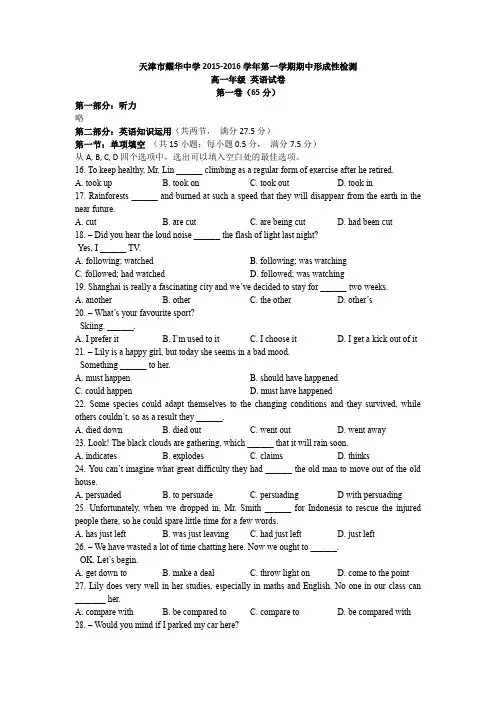
天津市耀华中学2015-2016学年第一学期期中形成性检测高一年级英语试卷第一卷(65分)第一部分:听力略第二部分:英语知识运用(共两节,满分27.5分)第一节:单项填空(共15小题:每小题0.5分,满分7.5分)从A, B, C, D四个选项中,选出可以填入空白处的最佳选项。
16. To keep healthy, Mr. Lin ______ climbing as a regular form of exercise after he retired.A. took upB. took onC. took outD. took in17. Rainforests ______ and burned at such a speed that they will disappear from the earth in the near future.A. cutB. are cutC. are being cutD. had been cut18. – Did you hear the loud noise ______ the flash of light last night?-Yes, I ______ TV.A. following; watchedB. following; was watchingC. followed; had watchedD. followed; was watching19. Shanghai is really a fascinating city and we’ve decided to stay for ______ two weeks.A. anotherB. otherC. the otherD. other’s20. –What’s your favourite sport?- Skiing. ______.A. I prefer itB. I’m used to itC. I choose itD. I get a kick out of it21. – Lily is a happy girl, but today she seems in a bad mood.- Something ______ to her.A. must happenB. should have happenedC. could happenD. must have happened22. Some species could adapt themselves to the changing conditions and they survived, while others couldn’t, so as a result they ______.A. died downB. died outC. went outD. went away23. Look! The black clouds are gathering, which ______ that it will rain soon.A. indicatesB. explodesC. claimsD. thinks24. You can’t imagine what great difficulty they had ______ the old man to move out of the old house.A. persuadedB. to persuadeC. persuading D with persuading25. Unfortunately, when we dropped in, Mr. Smith ______ for Indonesia to rescue the injured people there, so he could spare little time for a few words.A. has just leftB. was just leavingC. had just leftD. just left26. – We have wasted a lot of time chatting here. Now we ought to ______.- OK. Let’s begin.A. get down toB. make a dealC. throw light onD. come to the point27. Lily does very well in her studies, especially in maths and English. No one in our class can _______ her.A. compare withB. be compared toC. compare toD. be compared with28. – Would you mind if I parked my car here?- ______.A. Yes, pleaseB. Of course not. It’s not allowed here.C. I’d rather you didn’t actually.D. No, you’d better not.29. – Hurry, Mary! You ______ on the telephone.- Oh, I ______. Thank you, mum.A. have wanted; have comeB. will be wanted; will comeC. are being wanted; comeD. are wanted; am coming30. When and where to go for the on- salary holiday ______ yet.A. are not decidedB. has not been decidedC. is not being decideD. have not been decide第二节:完形填空(共20小题;每小题1分,满分20分)阅读短文,掌握其大意,然后从各题所给的A, B, C,D四个选型中,选出最佳选项。
天津市耀华中学2013—2014学年度第二学期期中形成性检测高二年级英语试卷第I卷(70分)★请同学们将试题答案填涂在答题卡上本试卷分第I卷(选择题)和第II卷(非选择题)两部分,共100分,考试时间90分钟,第I卷l页至8页,第II卷9页至l0页。
答卷前,请务必将自己的姓名、考号、座号填写在答题卡上和密封线外相关位置。
答卷时,务必将答案涂写在答题卡上,答在试卷上的无效。
考试结束后,将答题卡和答题纸一并收回。
祝各位同学考试顺利!第一部分:听力理解(共两节;每小题0.5分,满分10分)第一节(共5小题,每小题0.5分,满分2.5分)听下面5段对话。
每段对话后有一个小题,从题中所给的A、B、C三个选项中选出最佳选项,并标在试卷的相应位置。
听完每段对话后,你都有l0秒钟的时间来回答有关小题和阅读下一小题。
每段对话仅读一遍。
1.What is the man doing?A.Going to another country.B.Meeting the woman from abroad.C.Seeing the woman off.2.Where does the conversation take place?A.In a restaurant. B.In a garage. C.In a supermarket.3.When can the woman take a gain?A.At 5:15 am. B.At 5:15 pm C.At 6:00 pm4.What are t he two speakers doing?A.They are commenting on a game.B.They are watching a game on TV.C.They are playing in the game.5.What’s the reason that the man won't go outing tomorrow?A.He doesn't like going outing.B.He is not feeling well.C.He has to look after his mother.第二节 (共10小题,每小题0.5分,满分7.5分)听下面5段对话或独白。
【KS5U首发】天津市2013-2014学年高二寒假作业(2)英语 Word版含答案一、单项选择(共15小题,每小题1分,满分15分)从A、B、C、D四个选项中,选出可以填入空白处的最佳选项。
president Barack Obama is expecting the economy to show some ______ ofrecovery.A. signalsB. signsC. symbolsD. marks21.2.Mrs. Green always helps her mother even though going to work_________most of her day.A. takes outB. takes downC. takes upD. takes off3.The lady said she would buy a gift for her daughter with the _______.A. 20 dollars remainedB. remaining 20 dollarsC. remained 20 dollarsD. 20 dollars to remain4.The house rent is expensive. I’ve got about half the space I had at home and I’mpaying here.A. as five times muchB. as much five timesC. much as five timesD. five times as much5.His performance in the interview wasn’t good. I don’t suppose he will be offered the job, ____?A. do IB. don’t IC. will heD. won’t he6.______ to have a picnic here!A.What great delight B.How great delightC.What a great delight D.How a great delight7. has won the first prize?A. Who you thinkB. You think whoC. Who do you thinkD. Do you think who8.It was not ______she took off the glasses ________ I realized she was a famous film star.A. when; thatB. until; thatC. until; whenD. when; until9._______, his idea was accepted by all the people at the meeting.A. Strange as it might soundB. Strange although it might soundC. As it might sound strangeD. As strange it might sound10.A poet and artist _____ coming to speak to us about Chinese literature and paintingtomorrow afternoon.A. areB. isC. wereD. was11.______ at the top of the Oriental Tower, people below will look very small.A. StandB. StandingC. To standD. If you stand16.12.He wrote a lot of novels,none of________was translated into a foreign language.A.them B.what C.that D.which13.Unfortunately, when I arrived she ________, so we had only time for a few words.A. just leftB. had just leftC. has just leftD. was just leaving14.A murderer has escaped from prison, so a nationwide search for him is ______.A. on the wayB. in a wayC. in the wayD. under way15.Lydia doesn’t feel like __________ in the north as she is a little bit homesick.A. studyB. studyingC. studiedD. to study二、完型填空(共20小题;每小题1分,满分20分)阅读下面短文,掌握其大意,然后从16~35各题所给的四个选项(A、B、C和D)中选出最佳选项,并在答题卡上将该项涂黑。
高中英语真题:2013-2014学年高二下学期期中考试英语试题(本试卷满分150分,时间120分钟)第一部分:听力(共20题,每小题1.5分,满分30分)第一节(听下面5段对话,每段对话后有一个小题,每段对话仅读一遍)1.What does the man want to do?A.To write a checkB.To cook dinnerC.To read the newsp aper2.When will the film probably start?A.At 12:15B.At 12:30C.At 12:453.How did the man hear about the accident?A.From MaryB.In the newspaperC.On the television4.What can we learn from the conversation?A.The man is free on Tuesday evening.B.The man is free on Wednesday afternoon.C.The man is busy on Tuesday evening.5.What is the man dissatisfied with about the hotel?A.The awful dinner.B.The dirty room.C.The noisy environment.第二节(每段对话或独白读两遍)听下面一段对话,回答第6和第7两个小题。
6.How many times a day should the man take the medicine?A.TwiceB.Three timesC.Four times7.What shouldn’t the man do these days?A.SmokeB.Drink wine D.Overwork听下面一段对话,回答第8和第9两个小题。
【全国名校】2013-2014学年天津市耀华中学高二上学期期末考试英语卷学校:___________姓名:___________班级:___________考号:___________I、单选题(本大题共15小题,共15.0分)1.---Keep a____eye on your little girl!-Oh, my God! She is standing too ____to the fire.A.closely, closelyB.close, closelyC.close,closeD.closely , close2.Meeting my uncle after all these year was an unforgettable moment ,_______I will always remember.A.thatB.oneC.itD.what3.They____on the program for almost one month before l was arranged to help them. Now, we____on it as no result has come out.A.had been working: are still workingB.had worked; were still workingC.have been working; have workedD.have worked; are still working4..--I sent him a most interesting story book by mail this morning.--You____so; he's coming tomorrow morning.A.needn't doB.needn't have doneC.don't need to doD.didn't need do5.____all the required papers. he didn't answer the questions fluently in class.A.Having not readB.Not having readC.Not readD.Not to read6.My child didn't feel quite himself these days. The doctor said it was just a flu.What __________!A.a surpriseB.a pityC.a shameD.a relief7.People built a monument_________those who died for the country.A.in praise ofB.in need ofC.in hope ofD.in honor of8.In many cultures people who were thought to have the ability to ________ dreams were likely to be highly respected.A.interpretB.translateC.experimentD.transplant9.Hearing the interesting story, all the people present_______.A.burst into laughingB.burst into laughterC.burst out laughD.burst out laughter10.There is no doubt_______ English is the widely used language all over the world.A.thatB.whetherC.ifD.how11.Maybe there are some things among the girl's papers, like her school reports, old photos and so on. Can you ______them and give me whatever you find .A.go throughB.go acrossC.go aroundD.go withTV says that a storm will hit our city. In order to avoid________, we must takeour raincoat with us.13.---Could I ask you a rather personal question?-Sure_______.A.pardon meB.go aheadC.good ideaD.forget it14.Children often quarrel and even fight with each other, but it won't be long beforethey _______and play together.A.turn upB.show upC.take upD.make up15.---Do you believe a person will be alive forever?---_______ It's just a fantasy.A.Not reallyB.Of courseC.Not especiallyD.My pleasureII、完形填空(本大题共20小题,共30.0分)Last Christmas while staying with my parents, I across some old love letters that my parents wrote to each other. These letters were all pilled up in a basket, dirty and With dust. to read and sort them, I asked them if I could take the letters back to my Illinois home. They agreed.As I carefully opened each letter, all of them with age, I discovered a newpage unknown to me in this private chapter of my parents' lives.My father used to in the army. So his letters were full of frontline of the things about the war. Each of my mother's letters was marked with her 1944 dark red lipstick kiss. I was to these letters like a magnet (磁铁).Just six weeks after our Christmas visit, Daddy became very . and was hospitalized. This time, he was fighting a . kind of war. As I sat by his bedside, we discussed the . He told me how much receiving those lipstick-kissed letters had to him when he had been so far from home.It so happened that the next day would he February 14. From the letters I chose the card my father had sent Mother in 1944 and brought it to my father's bedside.At his bedside, I joked with him, saying , "Today is Valentine's Day, don't you want to send Mother a present?" He became more when I handed him the old . He carefully opened it and took out the card, and when he it, his eyes were filled with tears. My father, in a voice tight with read the loving he'd sent to my mother fifty-six years earlier. And this time, he could read it to her .A.AB.B16.A.A B.B C.C D.D17.A.A B.B C.C D.D18.A.A B.B C.C D.D19.A.A B.B C.C D.D20.A.A B.B C.C D.D21.A.A B.B C.C D.D22.A.A B.B C.C D.D23.A.A B.B C.C D.D24.A.A B.B C.C D.D25.A.A B.B C.C D.D26.A.A B.B C.C D.D28.A.A B.B C.C D.D29.A.A B.B C.C D.D30.A.A B.B C.C D.D31.A.A B.B C.C D.D32.A.A B.B C.C D.D33.A.A B.B C.C D.D34.A.A B.B C.C D.D35.A.A B.B C.C D.DIII、阅读理解(本大题共15小题,共30.0分)AOn the night of November 14, 1978,a six-year-old Korean boy was flying to theUnited States. All he knew was that he was on a plane heading for somewhere. The plane landed at Kennedy International Airport, where he was greeted by a family. This young boy was me.I have grown up in a town where there were few Asians, so I stuck out in the crowd. I made friends quickly and they treated me just like anyone else. You may ask if anyone made fun of my appearance. Well, of course, I met that' kind of person. I just shrugged it off.As an adopted child, I have something that others don't have. I have had the benefit oftwo families. I'm lucky to have got a chance to start a new life. But we must try never to forget our past. Someday I will go back to Korea to find out what kind of culture I left behind.There is only one thing that I regret about being adopted. When I argue with my parents and they realize they are losing the argument, they sometimes wonder what I would be doing if I were back in Korea. I don't understand this because I thought the purpose ofadopting someone was to give them a better chance of growing up in a family. Some day when I am older, I want to adopt a girl and raise her the way my parents have raised me, but I would do it better, for I know what went well and what did not.36.We learn that when the writer was on the way to his new family,______.A.he was with his own parentsB.he was very happy and excitedC.he was about ten years old thenD.he didn't know he was going to be adopted37.If someone sticks out in the crowd, it means that he/she_______.A.is very good-lookingB.is very kind-heartedC.is easily noticed by othersD.is disliked by others38.When the writer was made fun of by others, he _______.A.was deeply hurtB.wanted to go back to KoreaC.didn’t care about it that muchD.tried to make friends with them39.What can we learn from Paragraph 3?A.The writer wants to forget his past.C.The writer isn't interested in Korean culture.D.The writer aren't know anything about Korea.40.What does the writer want to do when he is older?A.Go back to live with his parents in Korea.B.Tell his parents what they have done wrong.C.Find out how to raise children in a better way.D.Adopt a girl and raise her in a good way.BAlthough similar in appearance to hyenas(土狼), African wild dogs are nevertheless true wild canine(犬). They are a mixture of black, yellow, and white in such a wide variety of patterns that no two individuals look exactly alike. African wild dogs are widely distributed across the African plains but they do not live in jungle areas.They are social animals, living in groups of usually from 2 to 45 individuals. A hierarchy(统团)exists within the group, but the animals are friendly to one another. The young and the infirm(体弱的)are given special privileges within the group.African wild dogs use their sense of sight, not smell, to find their prey. They can run up to 55 km/h for several kilometers. In eastern Africa, they mostly hunt Thomson's gazelles, but they will also attack calves, warthogs, zebras, impalas, and the young of large antelopes such as the gnu.Growing human populations have decreased or degraded the African wild dog's habitat and also diminished their available prey. Road kill and human persecution(迫害)have also had a negative impact on African wild dog populations. This species is also susceptible to a variety of diseases such as distemper, which is controlled in domestic .dogs. Conservation of the African wild dog's natural habitat must have the highest priority, as these dogs suffer in habitats modified by human intrusion(干扰).41.What does the underlined word " susceptible" mean?A.easily affected or sufferedB.badly doubtfulC.seriously harmfulD.highly dangerous42.What factors affect the population of the wild dogs?a. the distribution of the dogsb. social livingc. highly increasing human populationsd. human's killing the dogse. many diseasesf. the changes of their habitatsg. domestic dogs h. food reductionA.a. b, c, d, eB.b, c, d, e, fC.c, d, e, f, hD.d, e, f, g, h43.From the passage we can conclude that_______.A.African wild dogs are completely different from domestic dogs in size, weightB.African wild dogs are living in groupsC.African wild dogs use their eyes mostly when sleeping to guardD.African wild dogs use their noses to find their food in most cases44.What can we know about African wild dogs?A.In a pack there may be about 90 wild dogs and no leader.B.There are no such wild dogs that are different.C.African wild dogs can run at a speed of about 15 m/s for a long distance.D.All African wild dogs kill zebras, impalas, and antelopes as their food.A.African wild dogs are not in danger, because there are such a wide variety of patterns.B.African wild dogs are not in danger, because are widely distributed across the African plains.C.African wild dogs are in danger, because human's activities have a great effect on them.D.African wild dogs are in danger, because their habitats have been changed much.COne day, when I was working as a psychologist in England, an adolescent boy showed up in my office. It was David. He kept walking up and down restlessly, his face pale, and his hands shaking slightly. His head teacher had referred him to me. "This boy has lost his family," he wrote. "He is understandably very sad and refuses to talk to others, and I'm very worried about him. Can you help?" 'I looked at David and showed him to a chair. How could I help him? There are problems psychology doesn't have the answer to, and which no words can describe. Sometimes the best thing one can do is to listen openly and sympathetically.The first two times we met David didn't say a word. He sat there, only looking up to look at the children’s drawings on the wall b ehind me. I suggested we play a game of chess. He nodded. After that he played chess with me every Wednesday afternoon - in complete silence and without looking at me. It's not easy to cheat in chess, but I admit I made sure David won once or twice.Usually, he arrived earlier than agreed, took the chess board and pieces from the shelf and began setting them up before I even got a chance to sit down. It seemed as if he enjoyed my company. But why did he never look at me?"Perhaps he simply needs someone to share his pain with," I thought. "Perhaps he senses that I respect his suffering." Some months later, when we were playing chess, he looked up at me suddenly."It's your turn," he said.After that day, David started talking. He got friends in school and joined a bicycle club. He wrote to me a few times about his biking with some friends, an d about his plan to get into university. Now he had really started to live his own life.Maybe I gave David something. But I also learned that one - without any words – can reach out to another person. All it takes is a hug, a shoulder to cry' on, a friendly touch, and an ear that listens.46.When he first met the author, David________.A.felt a little excitedB.walked energeticallyC.looked a little nervousD.showed up with his teacher47.As a psychologist, the author_______ .A.was ready to listen to DavidB.was skeptical about psychologyC.was able to describe David's problemD.was sure of handling David's problem48.David enjoyed being with the author because he ______.A.wanted to ask the author for adviceB.need to share sorrow with the authorC.liked the children's drawings in the officeD.beat the author many times in the chess gameA.He recovered after months of treatment.B.He liked biking before he lost his family.C.He went into university soon after starting to talk.D.He got friends in school before he met the author.50.What made David change?A.His teacher's help.B.The author's friendship.C.His exchange of letters with the author.D.The author's silent communication with him.IV、其他(本大题共5小题,共5.0分)阅读短文,并按照题目要求用英语回答问题。
2013--2014年度第二学期高二期中试题第I卷选择题(共95分)第一部分:听力(共两节,满分20分)第一节(共5小题;每小题1分)听下面5段对话。
每段对话后有一个小题,从题中所给的A、B、C三个选项中选出最佳选项,并标在试卷的相应位置。
听完每段对话后,你都有10秒钟间来回答有关小题和阅读下一个小题。
每段对话仅读一遍。
1. What can we know about the man ?A .He can’t hear the woman clearlyB. He doesn’t want to answer the questionC. He is not able to answer the question2. How long will the play last for?A. one and a half hoursB. two hoursC. one hour and three quarters3. Where does the conversation probably take place ?A. in an officeB. in a shopC. in a restaurant4. Why is the man’s wife baking a cake ?A. It is her birthdayB. It is their son’s birthdayC. It’s the man’s birthday5. When will the talk be held ?A. on WednesdayB. on SaturdayC. on Thursday第二节(共10小题;每小题1.5分)听下面3段对话或独白,每段对话或独白后有几个小题,从题中所给的A、B、C三个选项中选出最佳选项,并标在试卷的相应位置。
听每段材料前,你将有时间阅读各个小题,每小题5秒钟;听完后,各小题将给出5秒钟的作答时间。
天津市天津一中2013-2014学年高二下学期期中考试英语第一卷I. 听力(共20小题,每题0.5分,满分10分)第一节(共5小题;每小题0.5分,满分2.5分)听下面5段对话。
每段对话后有一个小题,从题中所给的A、B、C三个选项中选出最佳选项,并标在试卷的相应位置。
听完每段对话后,你都有10秒钟的时间来回答有关小题和阅读下一小题。
每段对话仅读一遍。
例:How much is the skirt?A.£ 19.15B.£ 9.15C.£ 9.181. What will the man probably do?A. Go to a party.B. Meet his boss.C. Take a rest.2. What do we know about the man?A. He has been caught copying a report.B. He won’t leave till the last minute.C. He is not free at the moment.3. What is the woman concerned about?A. Her health.B. Her appearance.C. Her character.4. What does the man mean?A. The room will be warmer.B. The fridge will be fixed.C. The lights will be switched on.5. What does the man imply?A. He doesn’t care where to put the new shoes.B. The woman already has too many shoes.C. The new shoes do not look good enough.第二节(共15小题;每小题0.5分,满分7.5分)听下面5段对话或独白。
天津市耀华中学2013—2014学年度第二学期期中形成性检测高二年级英语试卷第I卷(70分)★请同学们将试题答案填涂在答题卡上本试卷分第I卷(选择题)和第II卷(非选择题)两部分,共100分,考试时间90分钟,第I 卷l页至8页,第II卷9页至l0页。
答卷前,请务必将自己的姓名、考号、座号填写在答题卡上和密封线外相关位置。
答卷时,务必将答案涂写在答题卡上,答在试卷上的无效。
考试结束后,将答题卡和答题纸一并收回。
祝各位同学考试顺利!第一部分:听力理解(共两节;每小题0.5分,满分10分)第一节(共5小题,每小题0.5分,满分2.5分)听下面5段对话。
每段对话后有一个小题,从题中所给的A、B、C三个选项中选出最佳选项,并标在试卷的相应位置。
听完每段对话后,你都有l0秒钟的时间来回答有关小题和阅读下一小题。
每段对话仅读一遍。
1.What is the man doing?A.Going to another country.B.Meeting the woman from abroad.C.Seeing the woman off.2.Where does the conversation take place?A.In a restaurant.B.In a garage.C.In a supermarket.3.When can the woman take a gain?A.At 5:15 am.B.At 5:15 pm C.At 6:00 pm4.What are the two speakers doing?A.They are commenting on a game.B.They are watching a game on TV.C.They are playing in the game.5.What’s the reason that the man won't go outing tomorrow?A.He doesn't like going outing.B.He is not feeling well.C.He has to look after his mother.第二节(共10小题,每小题0.5分,满分7.5分)听下面5段对话或独白。
每段对话或独白后有几个小题,从题中所给的A、B、C三个选项中选出最佳选项,并标在试卷的相应位置。
听每段对话或独白前,你将有时间阅读各个小题,每小题5秒钟;听完后,各小题将给出5秒钟的作答时间。
每段对话或独白读两遍。
听第6段材料,回答第6至7题。
6.When will the opera begin?A.At 7:00.B.At 8:00.C.At 9:00.7.What will the two speakers do after the conversation?A.Visit another place B.Go shopping.C.Take some photos.听第7段材料,回答第8至l0题。
8.What’s the weather like today?A.Windy.B.Rainy.C.Sunny9.What’s the temperature outside?A.Over twenty-four degrees B.Over thirty-four degrees.C. Over forty degrees.10.Which season does the man like?A.Winter.B.Autumn.C.Summer.听第8段材料,回答第11至13题。
11.How often does the man play basketball?A.Every day.B.Every other day.C.Every weekend.12.What kind of exercise did the woman often do before she got married? A.Jogging.B.Swimming C.Playing basketball.13.What will the woman do on Saturday evening?A.Do some running.B.Stay at home watching TV.C.Go swimming with the man.听第9段材料。
回答第14至l6题。
14.What does the man probably do?A.A social worker.B.A salesman.C.A policeman.15.What does the woman like doing when she is alone at home?A.Listening to the radio.B.Reading books C.Washing the clothes.16.Wh at’s the woman's problem?A.She feels useless to others.B.She is too old to walk.C.She has no calls.听第10段材料,根据所听到的信息回答第17至20题。
完成表格信息。
每小题不超过3个单词。
请将答案写在答题纸上相应题号的横线上。
第二部分:英语知识运用(共两节,满分30分)第一节:单项填空(共l5小题;每小题l分,满分l5分)从A、B、C、D四个选项中,选出可以填入空白处的最佳选项。
21.Although they had made careful preparation,unexpected difficulties in the course of their experiment.A.rose B.raised C.lifted D.arose22.Alice is going to join us,was agreed on the day before yesterday.A.it B.as C.what D.that23.If Betty says she will complete the job on time,you can always her to deliver the goods.A.rely on B.help with C.take on D.put on24.Look at the trouble I am in! If only I your advice.A.followed B.would follow C.had followed D.should follow25.It was on a cold winter night Tom was waiting for his girlfriend to see a movie with him the accident occurred.A.that;that B.when;thatC.when;who D.which;where26.The traditional approach to dealing with complex problems is to them into smaller and more easily managed problems.A.break;down B.break;in C.break;off D.break;out27.customs differs from country to country asks travelers to pay more attention to the differences.A.What B.That C.This D.Which28.If he well for his lessons yesterday, he so many difficulties now.A.prepared;wouldn't have B.had prepared;wouldn't have hadC.had prepared;wouldn't have D.prepared;wouldn't have had29.It was only when they were told of the importance of time they realized wasting time means wasting their life.A.until B.that C.then D.so30.We believe you have devoted yourself sure to come true.A.that;is B.all that;to be C.that all;are D.what;to is31.She has the window open,cold it is outside.A.whatever B.however C.no matter which D.no matter what32.Getting good sleep may be one of the answers to a healthy weight.A.maintain B.have maintainedC.be maintained D.maintaining33.It’s well knowd that good relationship between two countries the development of mutual culture and economy.A.results from B.breaks away fromC.contributes to D.sticks to34.—DO you t hink he’ll finish the job before five o’clock?—He will surely finish it on time he is left to do it in his own way.A.in that B.as long as C.in case D.as far as35.It is proposed that another meeting to discuss how to give more support to the underdeveloped area.A.be held B.have been held C.was held D.will be held第二节:完形填空(共15小题;每小题l分,满分15分)阅读短文,掌握其大意,然后从各题所给的A、B、C、D四个选项中,选出最佳选项。